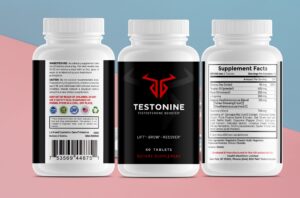The Role of Testosterone
Testosterone is the dominant male sex hormone that plays a pivotal role in a man’s physical and mental health. This anabolic steroid hormone promotes the development of male reproductive tissues and supports the secondary sex characteristics associated with masculinity.
Testosterone levels peak in a man’s late teens to early 20s. After age 30, testosterone begins declining naturally by 1% per year on average. While a small yearly decline may seem minimal, over a lifespan the dip in testosterone can be significant. Some men in their 30s already demonstrate more drastic decreases resulting from obesity, chronic stress, and other lifestyle factors.
When testosterone falls below optimal ranges, men experience troubling symptoms like low energy, reduced muscle mass, poor concentration, decreased motivation, and lagging libido. Furthermore, excess body fat, fatigue and loss of confidence contribute to additional mental and physical decline. These spirals into increasingly worsening health make addressing low testosterone vitally important.
Diagnosing Low Testosterone
The challenge is testosterone deficiency shares symptoms with other common conditions, making a clear diagnosis complex. Only blood testing can truly validate deficient levels. Doctors diagnose “low T” when total serum testosterone levels measure below 300 nanograms/deciliter (ng/dL). Some practitioners argue optimal testosterone ranges are between 500 – 800 ng/dL depending on age.
It is also essential doctors rule out problems with the pituitary gland or hypothalamus. These pathways in the brain trigger the testes to produce testosterone; damage could be sending faulty signals. So all diagnostic paths should explore primary vs secondary testosterone loss scenarios.
Treatment Options for Low T
If a blood analysis confirms clinically low testosterone, a physician may recommend hormone replacement therapy (HRT). Delivered through injections, gels, patches or pellets, HRT provides regular doses of testosterone medication to return levels to normal thresholds. Finding one’s optimal dose and delivery method requires working closely with an experienced hormone doctor along with routine blood testing.
Recently, some men look to boost declining testosterone through lifestyle adjustments rather than medically administered HRT regimes. Diet, exercise, sleep and stress all profoundly impact testosterone; optimizing these areas could potentially lift T-levels enough to alleviate symptoms of deficiency.
Diet
Eating more healthy fats while avoiding processed foods and sugary snacks provides the raw materials to manufacture healthy testosterone. Nutrient-dense foods like eggs, shellfish, nuts and cruciferous vegetables support production. Some spices like garlic and ginger also demonstrate testosterone boosting effects.
Exercise and Weight Loss
Both cardio and strength training stimulate temporary boosts in testosterone, especially when exercising large muscle groups. Furthermore, high-intensity interval training (HIIT) promotes greater spikes versus endurance activities. Just as importantly, reducing excess body fat clears pathways for the body to better produce and utilize circulating testosterone.
Sleep Management
Quality sleep allows the body to fully repair itself, balancing hormone pathways like the HPG axis governing testosterone production. Prioritizing 7-9 hours nightly, sticking to consistent bedtimes, limiting alcohol and creating an optimal sleep environment helps men maximize sleep integrity and related hormonal benefits.
Stress Reduction
When stress hormone cortisol runs high, testosterone dips low. Identifying and managing significant stressors via meditation, yoga, journaling and social support all attenuate cortisol spikes that disrupt optimal T. Reduce caffeine, add adaptogenic herbs, and increase activity in nature to reinforce anti-stress pathways.
Weighing Risks and Rewards of Treatment Options
All medical HRT protocols should involve careful planning, follow-up testing, and monitoring for side effects. Potential adverse reactions range from acne and mood swings to elevated red blood cell production and increased sleep apnea severity. Surveys also report up to 20% of low T men quit HRT due to discomfort, cost or inconvenience factors.
Alternatively, conservative treatment paths focused on lifestyle optimization avoid unknown risks of injecting or ingesting exogenous hormones long term. Through dietary adjustments, evidence-based supplements, disciplined fitness and stress reduction protocols, men could potentially raise testosterone high enough to resolve problematic symptoms. Patience is required as unlike injections, natural boosting mechanisms work gradually over 4-6 weeks. Healthy lifestyle changes however deliver compounding general health benefits as well.
Take Control with a Custom Plan
In the end each man must weigh up available data, assess risk tolerance for medical intervention, and gauge capacity for enacting lifestyle improvements. Whether pursuing TRT, conservative care or a hybrid approach, crafting a custom plan with one’s doctor provides the greatest chance for sustainable success. Monitoring progress through routine blood tests assesses treatment efficacy. Always report unusual reactions and remain vigilant for negative impacts on emotional health.
With careful systematic steps to boost declining testosterone by either traditional or natural methods, men can effectively counteract “aging male symptoms”, regain peak performance, and continue leading vigorous fulfilling lives well into old age. Employing a physiologist or anti-aging specialist rather than a general practitioner helps compile integrated care across primary care doctors, urologists, endocrinologists and cardiologists based one one’s health profile. Take control and run your own race by optimizing your body’s innate capacity for balanced hormone biochemistry.



